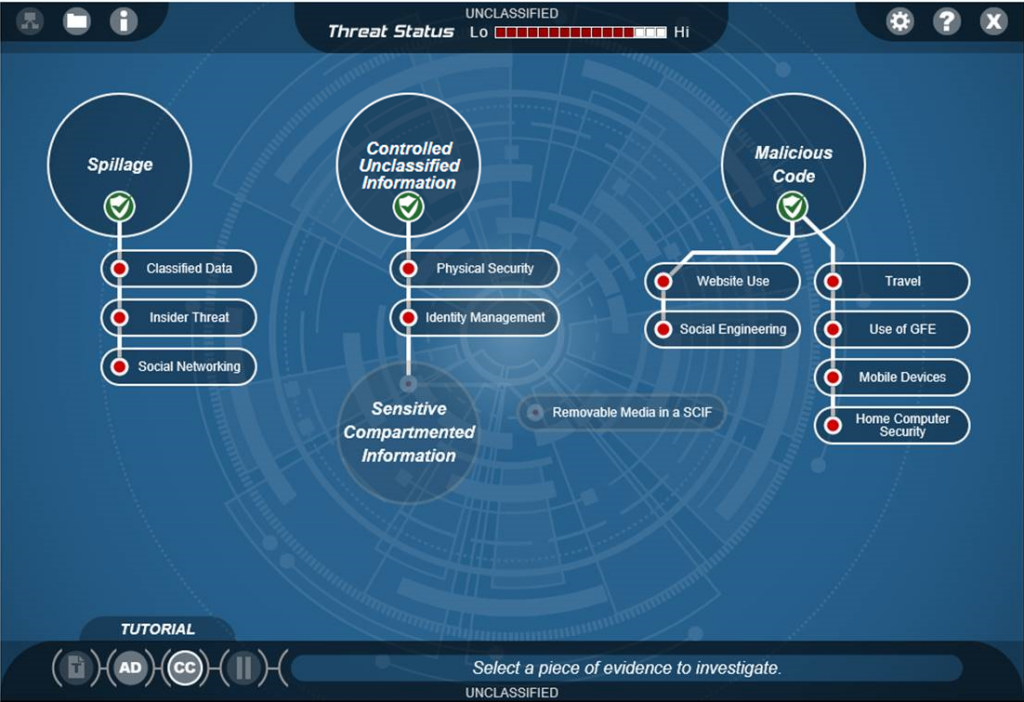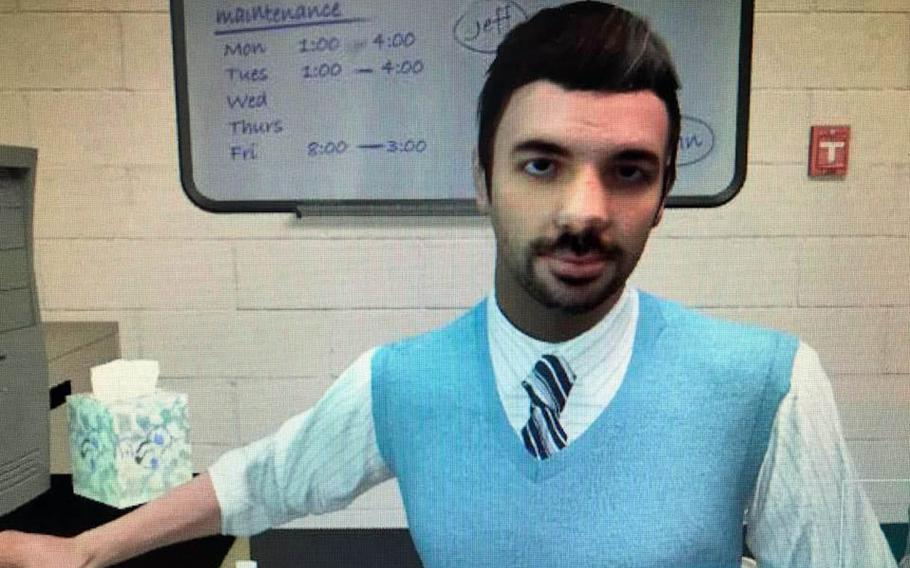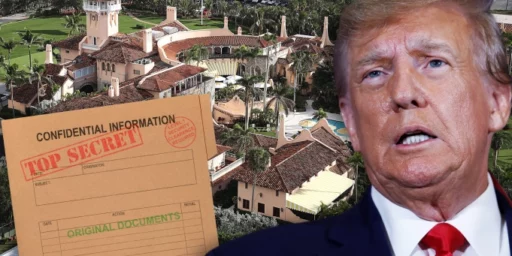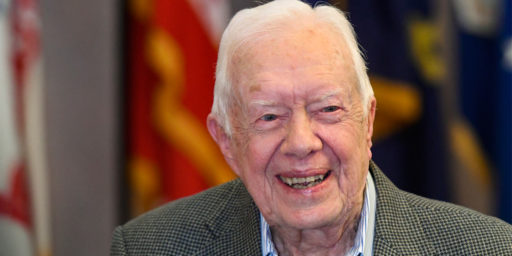Lackadaisical Handling of Secrets by Top Officials
It's becoming a sad joke.

The drip-drip-drip of revelations of President Biden’s possession of classified documents from his time as Vice President have, despite important differences, given political cover to former President Trump for his much more egregious transgressions. Yesterday’s revelations that former Vice President Pence has also turned over classified materials that he, presumably inadvertently, still possessed has turned the matter into a joke within national security circles.
Those of us in DOD, in particular, immediately conjure up our painful annual training.


A feature by three top Associated Press correspondents, “Classified records pose conundrum stretching back to Carter,” treats the matter fairly, emphasizing some themes discussed here, both by Steven and myself and several commenters, notably Andy, as this story has unfolded.
At least three presidents. A vice president, a secretary of state, an attorney general. The mishandling of classified documents is not a problem unique to President Joe Biden and former President Donald Trump.
The matter of classified records and who, exactly, has hung onto them got more complicated Tuesday as news surfaced that former Vice President Mike Pence also had such records in his possession after he left office. Like Biden, Pence willingly turned them over to authorities after they were discovered during a search he requested, according to his lawyer and aides.
The revelations have thrust the issue of proper handling of documents — an otherwise low-key Washington process — into the middle of political discourse and laid bare an uncomfortable truth: Policies meant to control the handling of the nation’s secrets are haphazardly enforced among top officials and rely almost wholly on good faith.
It’s been a problem off and on for decades, from presidents to Cabinet members and staff across multiple administrations stretching as far back as Jimmy Carter. The issue has taken on greater significance since Trump willfully retained classified material at his Florida estate, prompting the unprecedented FBI seizure of thousands of pages of records last year.
To reiterate: while all of the transgressions in question are unacceptable, probably illegal, handling of classified materials, Trump is the only one whose malfeasance was clearly intentional. All the others discovered the materials on their own (or, rather, their people did so) and promptly notified the proper authorities and turned them in. Trump, conversely, only turned them over after repeatedly ignoring requests from the National Archives and others to do so, finally necessitating the FBI coming to his compound with a search warrant in hand.
But that’s not really the point of this particular post:
It turns out former officials from all levels of government discover they are in possession of classified material and turn them over to the authorities at least several times a year, according to a person familiar with the matter who spoke on the condition of anonymity due to the sensitive nature of classified documents.
Current and former officials involved in the handling of classified information say that while there are clear policies for how such information should be reviewed and stored, those policies are sometimes pushed aside at the highest levels. Teams of national security officials, secretaries and military aides who share responsibility for keeping top-level executives informed — and the executives themselves — may bend the rules for convenience, expediency or sometimes due to carelessness.
It’s a contrast to the more rigid way the procedures are followed across the wider intelligence community, where mishandling information could be grounds for termination, a security clearance revocation or even prosecution.
“Executives go back and forth to their house with documents and read them. They read them at night, they bring them back,” said Sen. Tim Kaine, D-Va. He contrasted that pattern for top officials to senators, who are required to retain classified materials in secure rooms at the Capitol.
“I can see how this happens,” he added. “But again, every situation is different. They are all very serious. So, how many? How serious? How did you get them? Who had access to them? Are you being cooperative? And the same set of questions has to be answered with respect to Pence and with President Biden and President Trump.”
This is highly problematic but not entirely unreasonable. As appealing as the “if a staff sergeant or GS-12 had done this, they would be in jail” argument is, it’s apples and oranges. Senior officials simply aren’t going to be in a SCIF every time they access high-level secrets and they’re never really off the clock.
As for the judiciary, a separate federal law, the Classified Information Procedures Act, governs the handling of material that comes before judges in criminal prosecutions and civil lawsuits. Another law deals with foreign intelligence investigations that come before a special court that operates in secrecy. Both laws are intended to guard against the disclosure of classified information.
While Trump intended to keep the documents — he’s argued, in apparent disregard of the Presidential Records Act, that they were his personal property — he was hardly the first president to mishandle classified information.
Former President Jimmy Carter found classified materials at his home in Plains, Georgia, on at least one occasion and returned them to the National Archives, according to the same person who spoke of regular occurrences of mishandled documents. The person did not provide details on the timing of the discovery.
An aide to the Carter Center provided no details when asked about that account of Carter discovering documents at his home after leaving office in 1981. It’s notable that Carter signed the Presidential Records Act in 1978 but it did not apply to records of his administration, taking effect years later when Ronald Reagan was inaugurated. Before Reagan, presidential records were generally considered the private property of the president individually. Nonetheless, Carter invited federal archivists to assist his White House in organizing his records in preparation for their eventual repository at his presidential library in Georgia.
While he was by no means my favorite President, Carter is an honorable man. Laws such as this always start with the next Presidential term lest they be seen as motivated by partisan concerns (although, in this case, the same party controlled the White House, the House, and the Senate). But, having signed it, he was naturally going to comply with its spirit.
The National Archives declined to comment when asked to provide a list of times that classified documents were turned over to the agency by former officials.
Meanwhile, other former senior U.S. officials have insisted they have always appropriately handled classified materials. A spokesman for former Vice President Dick Cheney said he didn’t leave office with classified materials and none have been discovered at any point since. Freddy Ford, a spokesman for former President George W. Bush, told The Associated Press that “all presidential records — classified and unclassified — were turned over to NARA upon leaving the White House,” referring to the National Archives and Records Administration.
A spokesperson for President Barack Obama didn’t comment but pointed to a 2022 statement from the National Archives that the agency took control of all of Obama’s records after he left office and was “not aware of any missing boxes of Presidential records from the Obama administration.” Former President Bill Clinton’s office said, “All of President Clinton’s classified materials were properly turned over to NARA in accordance with the Presidential Records Act.”
None of that’s surprising. Whatever else one might think of him, Cheney is an old pro with a competent staff. Clinton, Bush, and Obama were all relative neophytes when they were sworn in but they were mindful of their own legacies and understood their duty to history to preserve records. (And, conversely, learned from Nixon not to create records they didn’t want kept.)
The closing days of any presidency are chaotic, as aides sort through years of their bosses’ accumulated materials to determine what must be turned over to the archives and what may be retained. Different teams of individuals are responsible for clearing different offices and maintaining consistent standards can prove challenging, officials said.
In Pence’s case, the material found in the boxes came mostly from his official residence at the Naval Observatory, where packing was handled by military aides rather than staff lawyers. Other material came from a West Wing office drawer, according to a Pence aide who spoke on condition of anonymity due to the sensitive nature of the discovery. The boxes were taped shut and were not believed to have been opened since they were packed, the person said.
Certainly, there has been no modern presidential transition anywhere near as chaotic is the most recent. Yet, while I think Pence is both an incompetent and a spineless toady, I have no reason to disbelieve his account of the matter.
There have also been accusations of mishandled documents while officials were still on the job. Former Attorney General Alberto Gonzales took home highly sensitive documents that dealt with the National Security Agency’s terrorist surveillance program and the terrorist detainee interrogation program in the late 2000s. Hillary Clinton was investigated for mishandling classified information via a private email server she used as secretary of state.
But rarely are officials punished for these mistakes. That’s in large part because, while federal law does not allow anyone to store classified documents in an unauthorized location, it’s only a prosecutable crime when someone is found to have “knowingly” removed the documents from a proper place.
I have no recollection of the Gonzales matter and have spilled plenty of pixels over the years on the Clinton matter. Suffice it to say, I simultaneously thought her setting up a personal server to conduct official business was egregious and seriously risked spilling secrets to our adversaries but that it was a matter of callous disregard of safe handling rather than malicious.
Mishandled documents are often returned with little fanfare or national news coverage. And there is no one reason for why records are mishandled, as the process of presidential records management plays out amid the chaos at the end of a presidential term and is based mostly a good-faith agreement between the archives and the outgoing administration.
“The National Archives has historically worked under an honor system with any administration,” said Tim Naftali, the first director of the Richard Nixon Presidential Library and Museum. “They work for the president and the vice president and they have partnerships with all these former presidents and vice presidents.”
Honor systems rely on honorable people. Thankfully, we’ve by and large had them at the highest levels. Even those, such as Nixon and Bill Clinton, whose character I would question in other matters, were at the end of the day patriots. They would shamelessly lie to further their political interests but could be trusted with the nation’s secrets.
The White House counsel’s office declined to comment Tuesday on whether Biden would order a review of how classified documents are handled across the government in response to the latest discoveries.
The power to change or amend how classified documents are handled rests largely with the president. Biden, who is actively under investigation, is not likely to instigate a review or order any changes in procedure because it could be seen as a political move meant to better his own circumstances.
That’s certainly true. Beyond that, it’s not quite clear to me how we would change the law with regard to the very highest officials (say, Cabinet Secretaries and above). Even if we decided they ought be held to the same standards as low-level intelligence analysts, there’s simply no appetite to hold them accountable in the same way.

![[Update] Analysis of NARA's Letter to Former President Trump](https://otb.cachefly.net/wp-content/uploads/2018/02/top-secret-stamp-magnifying-glass-clearance-large-512x256.jpg)


We know how classified is supposed to be handled. The issue is the White House and its procedures. Let’s start there rather than a sweeping multi-year “across the government” review.
The lack of information on what was found only adds to the confusion. We don’t need to know the precise nature, but the fact that Trump had documents at the highest level of classification is important. My understanding is that such classifications are taken very seriously and not applied without real need. But at the lower level of classifications? Was it a document that recorded a private conversation with a Head of State that might cause damage if it was revealed, or was it a list of staff who attended a meeting on “Russia”? Or an official guest list for a State dinner? This context would help.
Was Pence selling the documents to our enemies, or was it an oversight with full cooperation, like Biden?
In all seriousness, we live in an age where this stuff can be handled far better than it has been.
And none of this exonerates Trump in any way.
It seems like there’s a difference between documents that the government notices are gone and sends in a team to retrieve, and documents in an unopened box somewhere sitting around for years without ever being missed. Rules are rules but if both sets of documents are classified the same you are going to get various degrees of indifference to these rules. It’s human nature.
Whatever else one might think of him, Cheney is an old pro with a competent staff.
Right, the old pro who was taken in 100% by a double-agent named Curveball and whose chief of staff ended up being convicted of perjury and obstruction of justice in a case involving the leaked name of a CIA agent.
The “obvious” answer would seem to be that Presidents and other senior members of the government don’t get to walk away with boxes of documents. Turn it all over to the Archives, who will then make it a priority to send along originals and/or scanned copies of everything that’s not a problem. I vaguely recall — but am quite possibly mistaken — this is what Obama did, and the Archives were sending him hundreds of thousands of scanned pages per month for a long time.
I have to admit that if I were in that position, I’d be overjoyed at the idea of sending away a couple tons of paper and getting high-quality scans back for free.
No, not taken in, he wanted to be “fooled.”
This is really conflating two different things.
The primary issue here is the retention of classified documents after leaving office, and most of that seems to occur during the transition when stuff is boxed up and sent to the official’s house or wherever it’s going.
I’ve known plenty of mid-level people who had a classified laptop, a secure phone, and a GSA safe in their homes for storage to meet various mission requirements and at one point I had a STE in my residence. When they retired or got another job, they turned all that in, it did not end up in a box in their garage.
Most of this problem is a relatively easy fix by implementing normal security procedures during the WH transition to prevent stuff from walking out in randomly packed boxes. Based on recent reporting, it seems this packing activity is mostly done by staff (who should know better) or personal lawyers who don’t have security clearances (problematic). It isn’t a hard fix.
I thought they retired Jeff and Tina (Goodbye, Jeff and Tina: Cyber Awareness Challenge ditches beloved-but-corny characters)
Inside DoD joke. The annual security awareness training for years featured cartoon characters Jeff and Tina. That’s Jeff above. Almost attained cult status.
@Scott: I’m guessing that Jeff finally made SES and asked to be removed from the video. Tina probably took a buy-out, and no longer is a Fed. 🙂
@Modulo Myself:
You know, you bring up something that hadn’t occurred to me. I mentioned yesterday that the vast majority of classified documents are generated by the Presidential staff on the fly and aren’t checked out of some kind of Top Secret Library. But some are. And Trump had some of those, and the fact they weren’t returned during the transition was what got NARA stressed out. If it had been the type of documents Pence and Biden had NARA would have never even known they existed.
@MarkedMan:
Right, which raises a question of why they were classified. Was it real or could you have read the same thing in the NYTimes?
The main problem is the military. It’s a job and has nothing to do with defending anything. If you have opportunities (and unless you have the itch for being in the military or need the political angle of it) you probably are not going to be wasting your mind on helping wage drone warfare or analyzing a potential war with China. It’s a very obvious and sad truth. And all of the bureaucracy generated by the military is going to seem baroque and overdone, like going to prison for the first day and learning how to survive, except that you aren’t in prison.
@MarkedMan:
In the first case, at the WH, stuff gets printed in the SCIF and then taken around to people outside the SCIF. That’s not necessarily a problem as long as you know and track what’s coming and going. But it’s obvious at this point that most of this is not tracked, which is how it can be missing for years with no one realizing it. I’ve explained before how the WH is different from every government agency in its overuse of paper documents.
Secondly, IIRC, with Trump, NARA didn’t know about classified stuff initially but was asking for other things they did know about. Trump sent them some stuff, and some of that stuff was classified, which was the catalyst for further investigation and subsequent events.
Ha. Competent at dodging transparency and old pro at benefitting from short memories:
But we have to keep memory-holing this. So right-leaning whyte men can twist themselves into knots with tortured justifications for the double standards behind their biased, sexist, anti-Hillary Emailghazigatepalooza National B*tch Hunt that helped put Trump’s disastrously incompetent, white supremacist, wannabe-authoritarianism in power.
@Andy:
Sure, for stuff at a high classification level. But the list of attendees at a White House staff meeting or the notes from that meeting are not going to fall into that category. The whole place would grind to a halt if it did. That’s why I was saying above that it was frustrating we aren’t getting details on the types of documents found in Biden’s and Pence’s offices. The only documents we know for certain fall into the category you described were ones Trump had, and we only know that from court filings.
One: Cheney is an old pro. When he took classified material home no flunky was gonna find out about it. And what happened to his safes?
Two: I was wondering if James had moderated his views on HEREMAILZZZZ!!! over time and later developments. Looks like not.
@MarkedMan:
The investigations have just started, so it’s not surprising that there isn’t much information yet on what is or isn’t in the documents, especially since they are still looking for and finding stuff.
And we are only likely to get generalities or tidbits from leaks to the press if any of this stuff is still classified. I do hope, in the interest of transparency, that authorities provide a sense of what the documents contain, but we’ll have to wait and see.
This shows once again the incredible malpractice on Hillary’s emails by the mainstream press. It was known at the time that Condeleeza and Powell had similar emails systems and the stuff in Clinton’s server was piffle, but the press drag on and on for personal reasons and proceeded to elect Trump. The reality is that the US Gov overclassifies and stuff will inevitably end in peculiar places. The point is that there are secrets and then there are real secrets (nuke stuff, spies’ names, etc.).
@gVOR08: I would never imagine that Dr. Joyner has modified his views on Senator Clinton. I know I haven’t–though I never shared his views on Benghazemailgateapalooza–so I wouldn’t expect anyone else to either. (And it’s not been in the DNA of academics I’ve known over the years to admit error. 🙁 )
@Just nutha ignint cracker:
Hehe. Do you know any American male who has “admitting error” in his DNA? This is not our strong suit.
If anything, I should think the academic review process means they admit errors more often than the rest of us.
I suppose this will end with a big report on the handling of classified documents.
The report will be classified, the better to be found in garages, offices, and bathrooms across the country.
@Scott:
Red_chicken38!
@MarkedMan: A point I’ve made elsewhere. Trump, for example, is reported to have purloined his correspondence with Kim Jong-Un – original documents of which no copies were apparently made. We know the letters exist – Trump bragged about them. So what possible harm would be done by the DoJ confirming or denying that they were among the documents seized from Mar-a-Lago?
I confess I find it hard to reconcile talk of “the nation’s secrets” with the fact that more than 50 million classified documents are sitting in the federal bureaucracy at the moment. The surprise is not that some have been found in the wrong place, but that so few have been.
As to the competency of the Bush/Cheney administrations – they managed to lose more than 1,000 BOXES of classified documents, including 81 boxes containing Top Secret information or Restricted Data (nuclear weapons information). See https://sgp.fas.org/othergov/nara-wnrc.pdf
None of this mattered much before Trump – when we had people who were serious about the job in the White House. Norms seemed sufficient because we trusted the people in the office to not sell out the country for a few dollars or a cheap compliment on how handsome and powerful they were.
Like many situations before Trump, we now need to codify things that we never thought we would have to put into law.
It’s like having a 7-year-old child and you can’t believe you have to tell them that they can’t eat from the garbage can.